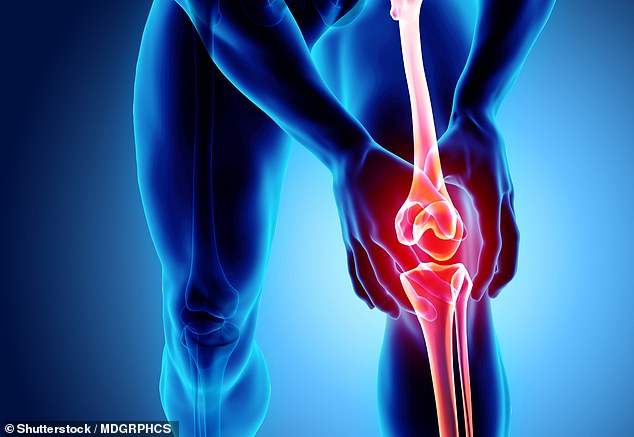A new monthly injection could be a revolutionary treatment for chronic joint pain caused by osteoarthritis, which affects 10 million people in the UK.
Results from a trial involving 510 patients with knee arthritis show that those who received the vaccine experienced a 50 percent reduction in pain levels after four months.
They also had none of the side effects associated with drugs such as ibuprofen and opioids, according to results to be reported today but published exclusively in advance in Good Health.
The drug, the first of its kind, currently called LEVI-04, works by blocking a compound that supports nerve cells involved in transmitting pain signals to the brain.
Researchers say the drug may also be effective for a wide range of other conditions, from back pain to frozen shoulder and some cancer pain, as well as all joints affected by osteoarthritis.
10 million people in the UK suffer from osteoarthritis, which causes chronic joint pain.
Osteoarthritis, or wear-and-tear arthritis, occurs when the protective cartilage at the ends of bones wears away over time, causing pain, swelling, and problems moving the joint as the bones rub against each other.
The knee is the joint most likely to be affected, accounting for just over half of all cases of the disease. Current treatments are aimed at reducing symptoms.
Nonsteroidal anti-inflammatory drugs (NSAIDs), such as ibuprofen, relieve pain and reduce inflammation, but carry the risk of stomach ulcers, for example. Stronger drugs, such as opioids, carry the risk of addiction.
The new treatment, developed by UK-based biotechnology company Levicept, is the first in a new class of drugs known as neurotrophin receptor fusion proteins.
These compounds target compounds called neurotrophins, including nerve growth factor (NGF).

The vaccine will not cure the disease, but rather aims to alleviate pain symptoms. Participants in the trial reported pain levels were at least 50 percent lower.
The compounds control the growth and maintenance of nerve cells involved in pain transmission.
Neurotrophin levels increase when there is tissue damage and inflammation, as occurs in osteoarthritis.
The new drug works by blocking the activity of NGF and other neurotrophins.
It is important to note that it does not completely inactivate them because they have other functions, including repairing tissues such as cartilage and bone.
For the trial, the 510 patients received monthly infusions and their self-reported pain levels were recorded. X-rays and MRIs were used to assess their joints.
The results showed that pain levels were at least 50 percent lower for each of the three different doses of the drug used in the trial.
There is hope that the drug could delay the need for joint replacement operations: according to the National Institute for Health and Care Excellence (NICE), 100,000 knee replacement procedures are carried out in the UK every year.
“I can’t believe how good the results are – they have the potential to be a game-changer in the treatment of chronic pain,” Philip Conaghan, professor of musculoskeletal medicine at the University of Leeds, who led the international trial, told Good Health.
Larger trials are now being planned and, if all goes well, the treatment could be available within three to four years.
Commenting on the research, Mike McNicholas, consultant orthopaedic surgeon at University Hospitals Liverpool, said: “Osteoarthritis is currently the most common disease with no cure. The results of this trial are exciting and encouraging.”
He added: “The treatment is aimed at alleviating symptoms, not curing them. But it’s good to see that the team is introducing this new technology responsibly and we hope that larger-scale trials will be reassuring in the absence of unexpected complications.”


